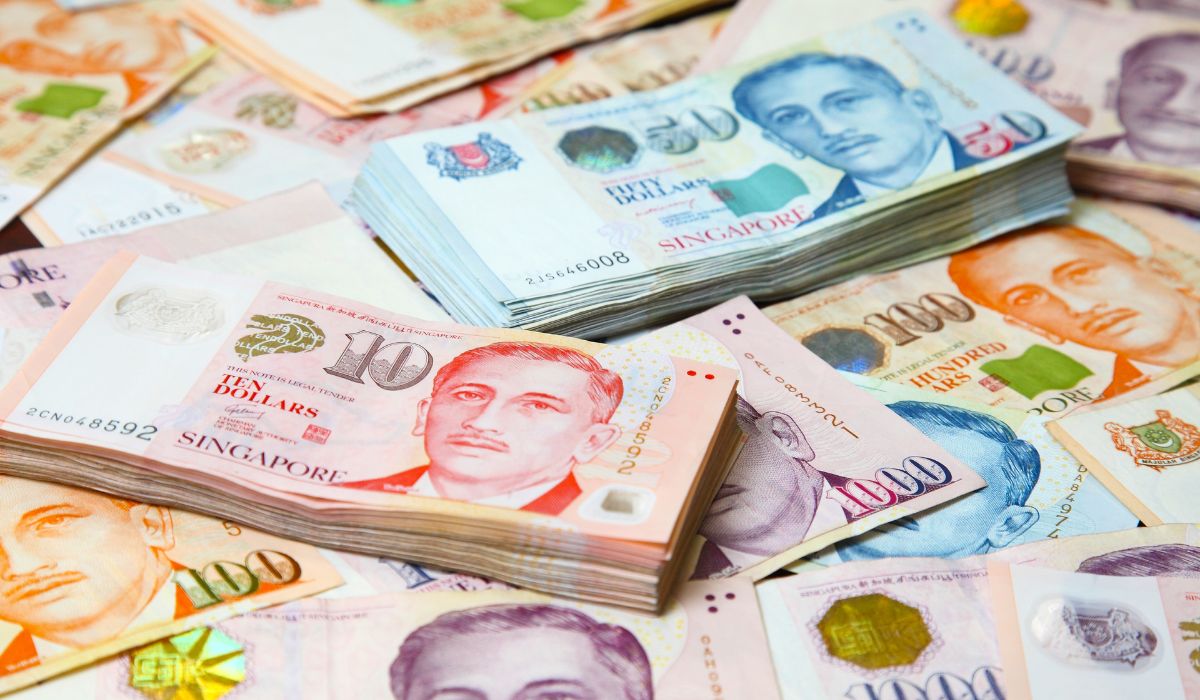ETF Investing 101
If you’re a beginner investor, ETFs are the perfect investment for you. With its low expense ratio, range of choices, low investment threshold, and incredible liquidity, it’s no wonder why ETFs in Singapore are so popular.
If you want to know more about what ETFs are, how they work, how you can buy, and the best ETF in Singapore to invest in, this guide to ETFs is perfect for you.
Here at OMY Singapore, you will discover the following:
- What is an ETF in Singapore?
- How to Buy ETF in Singapore: Easiest Ways You Can Do It
- Why Should You Invest in an ETF in Singapore?
- What Are the Disadvantages of Investing in an ETF in Singapore
- Questions to Ask Yourself When Investing in an ETF in Singapore
- Best S&P 500 ETF in Singapore
- What to Invest in an ETF in Singapore? Here’s What You Can Invest In
What Is An ETF In Singapore?
Exchange Traded Funds are packages of securities from various companies. It allows investors to diversify their portfolios in the easiest way possible. This can lead to more stability compared to investing in companies separately.
An ETF in Singapore can be listed on a broad country-based index like the Straits Times Index, S&P 500 Index, or the Hang Seng Index. It may also replicate narrower indexes that focus on tracking specific sectors, asset classes, or geographical locations.
How To Buy ETF In Singapore: Easiest Ways You Can Do It
The easiest way you can invest in an ETF in Singapore is through a stock brokerage account. For instance, if you want to know how to buy Vanguard ETF in Singapore, you can simply open a brokerage account with any platform.
More From OMY: Best Online Brokerages In Singapore
In the country, there are over 50 ETFs listed. Apart from SGX, local stock brokerage accounts give investors access to major stock markets abroad. Therefore, you may also choose to invest in US or Hong Kong exchanges if you want.
Aside from that, you can buy ETFs through the Regular Shares Savings or RSS plans in Singapore. Currently, there are various RSS providers you can choose from, and some of them give you the option to invest in individual stocks of ETFs listed overseas.
Third, you can invest in ETFs through a robo-advisory platform. There are over 10 platforms of this kind in Singapore, with a majority of them offering specialised solutions using ETFs. It’s worth noting that these platforms are predominantly exposed to US-listed broad indexes.
Why Should You Invest In An ETF In Singapore?
Here are the benefits of investing in an ETF in Singapore.
It’s one of the easiest ways to diversify your portfolio
ETFs allow investors to invest in several companies, industries, or even geographies with just one transaction. This will allow you to diversify your portfolios and have exposure to a wide range of assets, which can result in lower risk and virtually constant returns.
You don’t have to spend a lot of money to start investing
ETFs are available in a wide range of share sizes. This means that you can invest in them even if you’re on a tight budget.
It has high liquidity
As an exchange-traded security, ETFs are very easy to trade. They are also highly liquid since they are listed on stock exchanges. This gives investors the ability to buy and sell their ETF holdings quickly, which can lead to higher trading flexibility.
You don’t need a lot of trading experience
Although time and effort may be required in choosing the right ETF, there is no need for traders to have extensive knowledge or experience in stock analysis. However, it is recommended that beginners research well or seek the advice of a licensed financial professional.
ETFs are highly transparent
ETFs consistently disclose their holdings so you know exactly what you’re getting into. You can look inside the ETF you have and assess what you’re buying. This is a huge advantage over traditional funds that only reveal their top 10 holdings on a delayed basis.
It’s a great passive investment
Generally, ETFs don’t require a lot of effort to maintain. The low trading volume and management costs of these investment vehicles don’t require much attention so you don’t need to spend so much of your time constantly monitoring them.
What Are The Disadvantages Of Investing In An ETF In Singapore
Now that you know the benefits of investing in the best ETF in Singapore, you should also be familiar with the downsides you’ll potentially face in your investing journey.
There’s less diversification
Investors like you may be limited only to large-cap stocks because of a narrow group of equities in the index. Not only that, but a lack of exposure to mid and small-cap companies may mean you’re not going to be exposed to a lot of growth opportunities.
Intraday prices are not cheap
If you’re a long-term investor who plans on holding your SG ETF for 10 to 15 years, then this isn’t going to affect you much. However, investors who trade more need to keep intraday prices in mind. There is a high swing over a couple of hours which may motivate you to do a trade irrationally.
The dividend yields are lower
For dividend-paying ETFs, expect the yields to be not as high compared to when you own a high-yielding stock. Exchange Traded Funds usually give you less risk, but if you can take on more risk, then expect your dividend to be higher. While you can choose the stock with the best yield, ETFs track a bigger market so your overall yield will be averaged out.
More From OMY: A Beginner’s Guide to Dividend Investing in Singapore
There is a lack of personalization
ETFs are not actively managed so it doesn’t take into consideration your specific financial risk tolerance or goals. This lack of personalization may mean that investors won’t be able to tailor their portfolios to fulfil their specific financial needs or interests.
You have limited choices
Although there are tons of ETFs available in Singapore, the options are limited compared to other investments like mutual funds. Therefore, many investors are unable to find the right ETF that matches their investment needs perfectly.
Questions To Ask Yourself When Investing In An ETF In Singapore
All investors are always hungry for tips on investing. Follow these timeless tips to help you grow your money.
What are your investment goals?
What are you investing for? Are you investing for a future vacation? Are you investing to pay for your child’s education? Are you investing to generate passive income? Are you investing for retirement? Are you going to use the money to buy a home or a car?
This is the first question you need to ask yourself. Your investment goals will guide you in choosing which ETF is perfect for you.
What’s your investment strategy?
What strategy do you want to follow for your ETF investment? Do you want to focus on one or two asset classes? Do you want to follow a specific geographical area? Do you want to follow trend investing or value investing? You need to answer these questions first before you decide on which ETF is best for you.
Do I fully understand ETFs and their assets?
If you’ve decided to invest in an ETF, then you should make sure that you have a clear understanding of what you’re getting yourself into. If you are not sure, you can download the prospectus of the ETF and read it to be sure you understand the components of the funds and what you are getting in your investment.
What are the costs, fees, and commissions associated with this investment?
After understanding what an ETF is, the next step is to find out how much it costs to invest. This can be extremely cost-effective in some cases, especially since there are so many online brokerage platforms that offer free or minimal trading fees. Keep in mind that there are also ETFs that have extra management fees. This can add up, especially if you’re day trading.
Should I expect dividends?
Some ETFs are designed to pay you dividends. If you are looking for passive income, this may be a good option. However, some companies don’t pay out dividends, especially those that are experiencing a growth period.
Best S&P 500 ETF In Singapore
Google, Amazon, Apple, and Tesla – there are extremely popular brands everyone is familiar with, even outside the US. But did you know that you can also be an investor in these companies and participate in their growth?
The S&P 500 Index has a market value of around $40 trillion, and it is the combination of the representative stock performance of the US top 500 companies.
Investing in the biggest and most stable companies in the US will give you long-term growth. While these companies are not immune to market crashes, they are more resilient.
If you’re wondering how to invest in S&P 500 in Singapore, it’s easy. There are various funds that track the performance of S&P 500 shares. The Singapore S&P 500 ETFs include, but are not limited to:
- Vanguard S&P 500 ETF (VOO)
- Vanguard S&P 500 UCITS ETF (VUSD)
- iShares S&P 500 (IVV)
- SPDR S&P 500 UCITS ETF (SPY5)
After selecting which ETF you want to invest in, all you need to do is to contact a broker or open an account in an online trading platform such as:
- Saxo markets
- Moomoo
- Tiger Brokers
What To Invest In An Etf In Singapore? Here’s What You Can Invest In

Here are the best ETF investments you can make. This Singapore ETF list all have a great track record.
| Best Singapore ETFs | What Does It Track? |
|---|---|
| SPDR Straits Times Index ETF (SGX: ES3) | Top 30 companies on the SGX |
| Lion-OCBC Securities Hang Seng Tech ETF (SGX: HSS) | Top 30 tech companies on the HKEX |
| SPDR Gold Shares ETF (SGX: O87) | Gold bullion price |
| Phillip Sing Income ETF (SGX: OVQ) | Top 30 SGX listed companies based on the Morningstar indexes |
| Nikko AM SGD Investment Grade Corporate Bond ETF (SGX: MBH) | Quasi-sovereign, Singapore, and foreign corporate bonds |
| Xtrackers MSCI Singapore UCITS ETF (SGX: o9a) | Singapore large size, mid-size, and small capitalisation companies |
| iShares USD Asia High Yield Bond Index ETF (SGX: O9P) | High yield bonds by Asian or Asian-based governments and companies |
| ICBC CSOP FTSE Chinese Government Bond Index ETF US$D (SGX: CYB) | FTSE Chinese Government Bond Index performance |
| Lion Phillip S-REIT ETF (SGX: CLR) | High dividend Singapore REITs |
| ABF Singapore Bond Index Fund (SGX: A35) | Singapore government and quasi-government bonds |
| PRINCIPAL ASEAN40 (SGX: QS0) | Performance of the FTSE/ASEAN 40 Index, as well as the best-performing countries in ASEAN |
A Word From OMY
Investing in an ETF in Singapore is easier than you think. Now that you know how to buy index funds in Singapore and how you can make money out of it, you’re all set to start. Just remember to do your due diligence and invest with your financial goals in mind.
More From OMY:







